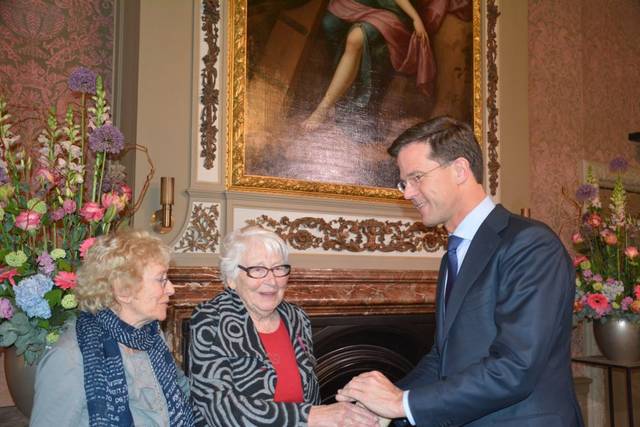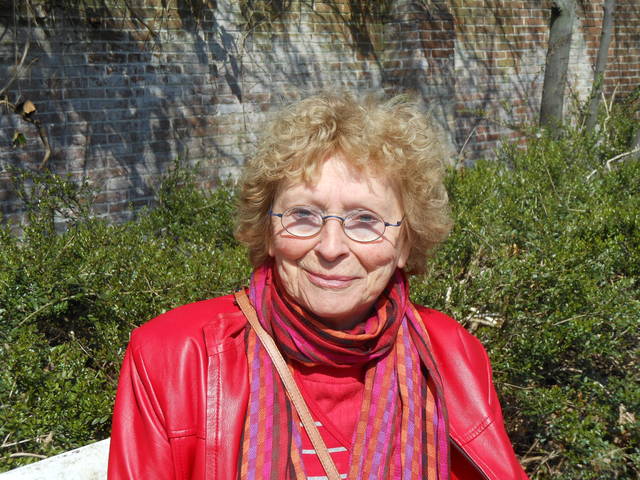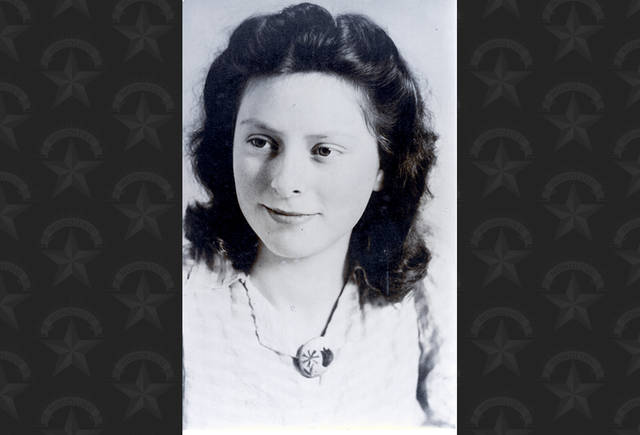Freddie Oversteegen, Dutch resistance fighter, dies at 92

NEW YORK TIMES
In a photo via the National Hannie Schaft Foundation, Feddie Oversteegen, left, and her sister, Truus, during a ceremony where they were awarded the Mobilization War Cross by Mark Rutte, the Dutch prime minister, right. Oversteegen was only 14 when she joined her sister and a law student as an all-female underground trio of saboteurs and assassins in German-occupied Holland. Dekker-Oversteegen died on Sept. 5, 2018, the day before her 93rd birthday.

NEW YORK TIMES
In a photo via the National Hannie Schaft Foundation, Feddie Oversteegen in 2013. Oversteegen was only 14 when she joined her sister and a law student as an all-female underground trio of saboteurs and assassins in German-occupied Holland. Dekker-Oversteegen died on Sept. 5, 2018, the day before her 93rd birthday. (

NEW YORK TIMES
In a photo via the National Hannie Schaft Foundation, Feddie Oversteegen around age 18. Oversteegen was only 14 when she joined her sister and a law student as an all-female underground trio of saboteurs and assassins in German-occupied Holland. Dekker-Oversteegen died on Sept. 5, 2018, the day before her 93rd birthday.



Freddie Oversteegen was only 14, petite with long braids, when she became an assassin and saboteur.
It was 1940, Germany had invaded the Netherlands, and she and her sister, Truus, who was two years older, had been recruited by the local Dutch resistance commander, in the city of Haarlem.
“Only later did he tell us what we’d actually have to do: Sabotage bridges and railway lines,” Truus Menger-Oversteegen recalled in a 2014 book, “Under Fire: Women and World War II.” “We told him we’d like to do that.”
Then the commander added, “’And learn to shoot — to shoot Nazis,’” she said.
“I remember my sister saying, ‘Well, that’s something I’ve never done before!’ ”
The sisters, along with a lapsed law student, Hannie Schaft, became a singular female underground squad, part of a cell of seven, that killed collaborators and occupying troops.
Don't miss out on what's happening!
Stay in touch with breaking news, as it happens, conveniently in your email inbox. It's FREE!
The three staged drive-by shootings from their bicycles, seductively lured German soldiers from bars to nearby woods, where they would execute them, and sheltered fleeing Jews, political dissidents, gay people and others who were being hunted by the invaders.
Freddie Dekker-Oversteegen, the last surviving member of the trio, died Sept. 5, the day before her 93rd birthday, at a nursing home in Driehuis in the Netherlands, about 5 miles from where she was born.
Her death was announced by Jeroen Pliester, the chairman of the National Hannie Schaft Foundation, which the Oversteegen sisters started in 1996.
Schaft was captured, tortured and executed by the Nazis on April 17, 1945, 18 days before the liberation of The Netherlands. She was 24. After the war, Schaft, the martyred “girl with the red hair,” as she had been called by the Nazis, was hailed as a national heroine.
Truus Oversteegen, the leader of the three, went on to marry a fellow resistance fighter, become a painter and sculptor of works that were largely inspired by the war, write a memoir titled “Not Then, Not Now, Not Ever” and lecture about her experiences. She died in 2016.
Freddie Oversteegen said she had felt sidelined after the war, in part because she had been a member of a Communist youth group; the Dutch government was soundly anti-Soviet.
Of the three young women, she was the most reserved, even though she was the first of them to fatally shoot a German soldier. (He had been lured from a bar into the woods.) Asked in 2016 by the online magazine Vice Netherlands how she had later dealt with her participating in wartime brutality, she replied, “By getting married and having babies.”
She also said that until she and Truus were profiled in a 2016 TV documentary in the Netherlands titled “Two Sisters in the Resistance,” she had been envious of her sister. By then, Truus had become a well-known author.
“I have always been a little jealous of her because she got so much attention after the war,” she said of Truus. “But then I’d just think, ‘I was in the resistance as well.’”
In 2014, both sisters were awarded the Mobilization War Cross by Mark Rutte, the Dutch prime minister.
Oversteegen married Jan Dekker, an engineer for the Dutch steel producer Koninklijke Hoogovens. She is survived by their three children, four grandchildren and a stepbrother from her mother’s second marriage.
Freddie Nanda Oversteegen was born Sept. 6, 1925, in Schoten, a village in the province of North Holland, to Jacob Oversteegen and Trijntje van der Molen. (Schoten is now part of Haarlem.)
Her parents were members of International Red Aid, a social service group organized by the Communist International. Freddie and her sister joined the Dutch Youth Federation, another Communist affiliate, and made dolls for children caught up in the Spanish Civil War.
After their parents divorced, amicably (Jacob sang a farewell serenade in French), the girls and their mother moved into a small North Holland apartment, where the sisters shared a bunk. As early as the mid-1930s, the family took in Jews fleeing from Germany. After the Germans invaded, Jews were hidden elsewhere because the Oversteegens feared that their Communist leanings might invite exposure. Many were discovered nevertheless.
“They were all deported and murdered,” Oversteegen told the anthropologist Ellis Jonker in “Under Fire: Women and World War II.” “We never heard from them again. It still moves me dreadfully, whenever I talk about it.”
The sisters worked as nurses in Enschede, on the German border in eastern Holland, where they could surreptitiously report on a German military airport. They also distributed leaflets and anti-Nazi posters.
Their anti-Nazi activities brought them to the attention of Frans van der Wiel, the Dutch underground leader in Haarlem, who visited them and, with their mother’s blessing, persuaded them to join the Council of Resistance. Their mother gave them only one rule, Oversteegen said: “Always stay human.”
Retaining their humanity became more challenging once the sisters joined the seven-member underground cell based in Haarlem (they and Schaft were the only women) and learned that their job would entail blowing up bridges and railway tracks and murder.
“Yes, I’ve shot a gun myself and I’ve seen them fall,” Freddie Oversteegen told a TV interviewer. “And what is inside us at such a moment? You want to help them get up.”
Still, she justified killing collaborators, who had betrayed her neighbors, and foreign soldiers, who had invaded and occupied her country.
“We had to do it,” she said. “It was a necessary evil.”
Oversteegen also rebutted criticism that the resistance had provoked German retaliation against innocent civilians.
“What about the 6 million Jews?” she said. “Weren’t they innocent people? Killing them was no act of reprisal. We were no terrorists. The real act of terror was the kidnapping and execution of innocent people after the resistance acted.”
The three women drew the line once, though, according to Kathryn J. Atwood’s book “Women Heroes of World War II: 26 Stories of Espionage, Sabotage, Resistance and Rescue” (2011).
They had been ordered to kidnap the children of the politician and senior Nazi officer Arthur Seyss-Inquart, commissioner of the occupied Netherlands. The plan was to swap the children for imprisoned members of the Dutch underground. The three refused because the children could have been killed if the exchange went awry.
“We are no Hitlerites,” Schaft was quoted as saying in the book. “Resistance fighters don’t murder children.”
© 2018 The New York Times Company




